If you’ve served in the military and now live with a constant ringing in your ears, you’re not alone. This condition — known as tinnitus — is one of the most common service-connected disabilities among U.S. veterans today adn in this article you will get complete guide on Ringing in Ears VA Disability.
Whether it sounds like a high-pitched whine, buzzing, or clicking that never stops, tinnitus can take a serious toll on your sleep, focus, and peace of mind. And the worst part? Many veterans don’t even realize they may be eligible for monthly compensation through the VA.
In this post, you’ll learn exactly how to:
- Understand what tinnitus is and how the VA views it
- File a VA disability claim for ringing in your ears
- Avoid common mistakes that lead to claim denials
- Explore natural options that may help relieve symptoms
Let’s break it all down, step by step — and help you get the support you’ve earned.
What Is Tinnitus (Ear Ringing)? – Ringing in Ears VA Disability
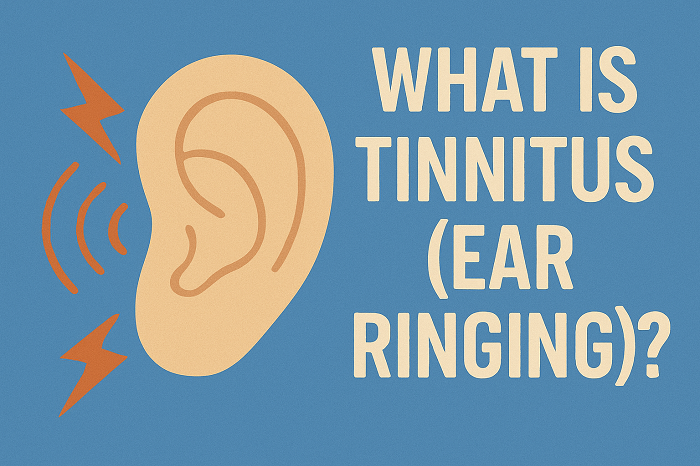
Tinnitus is the perception of sound in your ears or head when there’s no external source. It often sounds like ringing, buzzing, hissing, clicking, or whooshing. For some, it’s constant. For others, it comes and goes — but when it’s there, it can be hard to ignore.
It’s important to understand that tinnitus isn’t a disease — it’s a symptom of an underlying issue. That issue could be hearing loss, exposure to loud noises (like gunfire or machinery), ear injuries, or even something as simple as earwax buildup.
For veterans, tinnitus is often the result of service-related noise exposure — whether in combat, training, or working around loud equipment. Over time, this exposure can damage the delicate nerves in the ear, leading to a constant ringing that never fully goes away.
Tinnitus isn’t just a minor annoyance. It can have a major impact on your daily life and mental health. Many people with chronic tinnitus struggle with:
- Insomnia or poor sleep quality
- Difficulty concentrating or focusing on tasks
- Anxiety, irritability, or even depression
If you’re dealing with this every day, you’re not imagining things — and you’re not alone. The good news is: you may be entitled to VA disability benefits, and there are ways to manage the symptoms naturally too.
Is Ringing in the Ears a VA Disability? – Ringing in Ears VA Disability
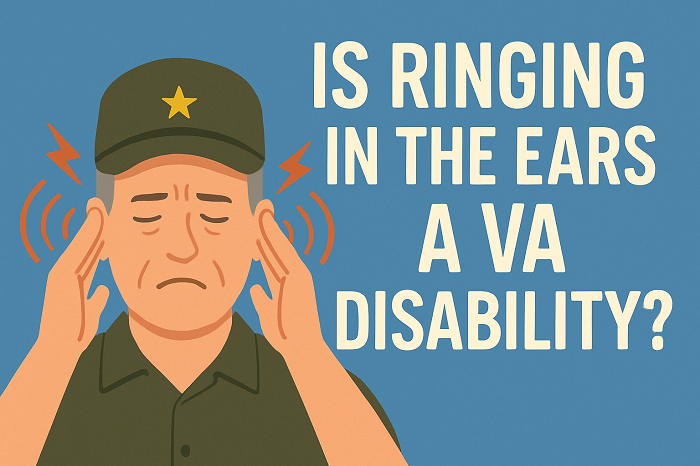
Yes — tinnitus (ringing in the ears) is officially recognized as a disability by the U.S. Department of Veterans Affairs (VA). In fact, it’s one of the most common service-connected disability claims filed by veterans.
The VA assigns a 10% disability rating for tinnitus. This rating is standard, regardless of whether the ringing affects one ear or both. Even if your tinnitus feels severe, the rating typically doesn’t go higher unless it’s connected to other conditions like hearing loss or PTSD.
As of 2025, a 10% rating provides approximately $171.23 per month in tax-free compensation. While it may not sound like much, getting approved for tinnitus opens the door to additional benefits and can help support further claims tied to your hearing health.
If your tinnitus began during or after your military service — especially if you were exposed to loud noise, gunfire, explosives, or machinery — you may qualify for this benefit.
📝 Click here to view the official VA page on tinnitus claims
VA Disability Rating for Tinnitus – Ringing in Ears VA Disability
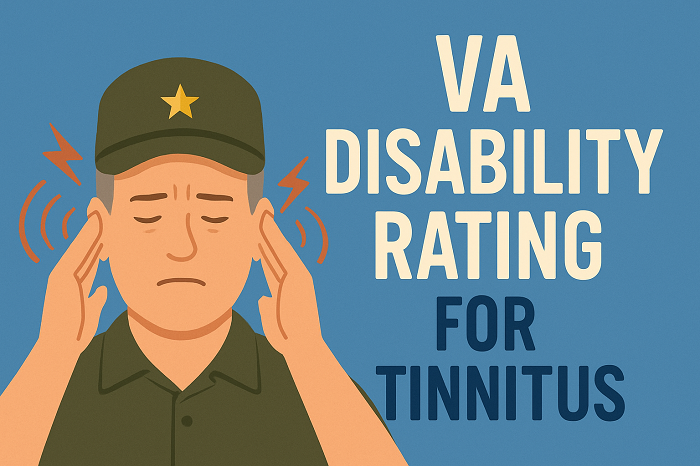
If you receive a service-connected disability rating for tinnitus from the VA, the standard rating is 10% — even if the ringing affects both ears.
That 10% rating is considered the maximum for tinnitus when claimed as a standalone condition. So whether your symptoms are constant, severe, or affect both ears, the VA typically issues the same rating.
As of 2025, a 10% VA disability rating results in a monthly tax-free payment of approximately $171.23.
This may not sound like a huge amount, but it’s important to understand the bigger picture: Tinnitus can act as a “gateway” condition.
If your tinnitus is connected to or caused by another issue — such as:
- Service-related hearing loss
- PTSD or mental health conditions
- Chronic headaches or migraines
- Sleep disturbances
—you may be eligible for additional disability ratings and monthly compensation beyond the basic 10%.
That’s why filing properly — and including all related symptoms — is key to receiving the full benefits you’ve earned.
How to File a VA Claim for Tinnitus
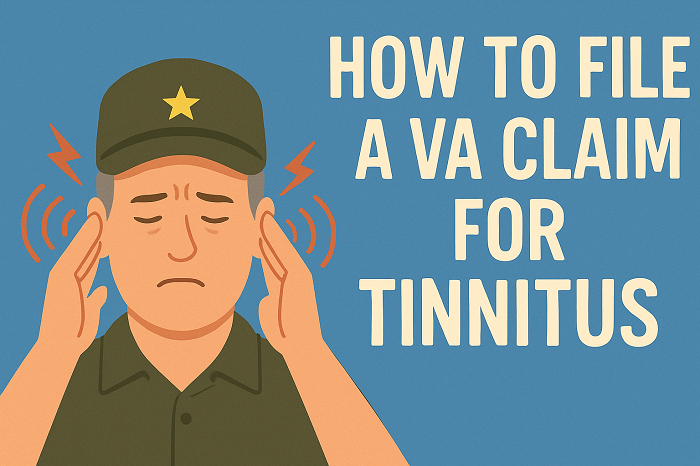
Filing a VA claim for tinnitus can feel overwhelming — but it doesn’t have to be. Here’s a simple, step-by-step process to help you file correctly and improve your chances of getting approved.
1. Gather Your Medical Evidence – Ringing in Ears VA Disability
Start by collecting any documents that support your claim, including:
- Audiologist evaluations showing symptoms of tinnitus
- Service treatment records proving exposure to loud noise (e.g. combat, artillery, engine rooms)
- Private or VA medical records mentioning ringing in the ears
2. Complete VA Form 21-526EZ – Ringing in Ears VA Disability
This is the official form for disability compensation. You can:
- Fill it out online through VA.gov
- Or print and mail the paper form
Make sure to clearly state when your tinnitus began and how it’s connected to your military service.
3. Attend the C&P Exam
Once your claim is submitted, the VA will likely schedule a Compensation & Pension (C&P) Exam. This is where a VA-contracted doctor evaluates your tinnitus symptoms.
- Be honest and thorough — explain how it affects your sleep, concentration, and daily life
- If your symptoms aren’t taken seriously, your claim may be denied
4. Submit the Claim
You can file your completed claim in one of three ways:
- Online at VA.gov
- With the help of an accredited Veterans Service Officer (VSO)
- By mailing it to your regional VA office
After submission, check your claim status regularly, and be prepared to provide additional info if requested.
🛡️ Filing a complete and well-supported claim is the best way to secure your benefits — and begin managing tinnitus with the resources you deserve.
Common Reasons Tinnitus Claims Get Denied
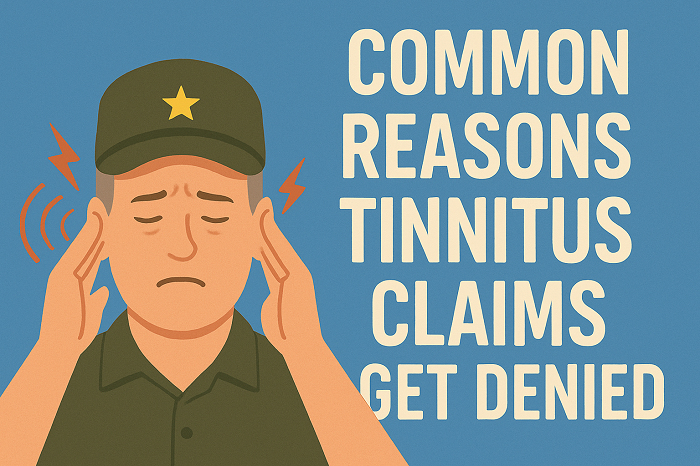
Getting denied for a tinnitus VA claim is frustrating — especially when you’re living with the constant ringing every day. Here are the most common reasons veterans get denied, and what you can do to avoid those pitfalls.
1. No Clear Service Connection
The VA needs proof that your tinnitus was caused or aggravated by your military service. If there’s no documentation of loud noise exposure, injuries, or events during service, the claim may be denied.
2. Lack of Medical Diagnosis
Many veterans experience symptoms but don’t have an official diagnosis from a medical professional — especially an audiologist. Without this, the VA can’t confirm you have tinnitus, even if your symptoms are real.
3. Incomplete Documentation
Submitting a claim without full supporting evidence — like service treatment records, hearing tests, or symptom descriptions — often leads to a denial. Missing paperwork, vague timelines, or poorly written forms are red flags to VA reviewers.
✅ Pro Tip: Include a Nexus Letter
One of the most powerful pieces of evidence you can submit is a nexus letter. This is a statement from a doctor or audiologist clearly connecting your tinnitus to your military service.
It should include:
- Your medical history
- Details of your military service and noise exposure
- A professional opinion linking the two
A strong nexus letter can make the difference between a denied claim and an approved one.
Can You Increase Your Rating for Tinnitus?
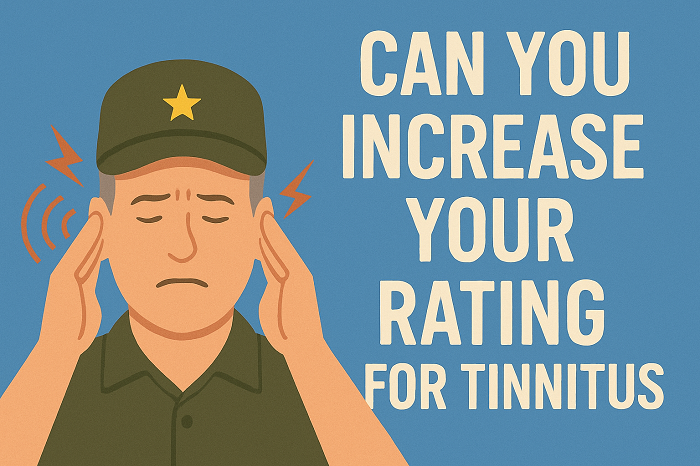
By itself, tinnitus is capped at a 10% VA disability rating. So even if you have severe ringing in both ears, or it affects your daily life, the VA typically won’t increase the rating beyond that.
However, there are exceptions — and this is where smart filing can really help. You may qualify for a higher overall disability rating if your tinnitus is linked to other service-connected conditions.
Here’s how you may increase your total rating:
- Hearing Loss: Many veterans have both tinnitus and measurable hearing damage. If so, you may qualify for an additional rating.
- Anxiety or PTSD: Chronic ear ringing can cause or worsen mental health issues — especially if it’s affecting your sleep or daily function.
- Sleep Disorders: Tinnitus often makes it hard to fall or stay asleep. If diagnosed, sleep issues may qualify for a separate rating.
To pursue a higher combined rating, you’ll need:
- Strong medical evidence of the related conditions
- Documentation showing how they’re connected to your tinnitus
- Separate claims or secondary condition filings
🔗 Can You Get VA Disability for Sleep Issues Caused by Tinnitus?
💡 Tip: If your symptoms go beyond just ringing — like anxiety, insomnia, or hearing problems — don’t settle for just 10%.
Explore your options for secondary claims and build a strong case with the help of a VSO
Natural Ways to Support Ear Health

While tinnitus doesn’t have a medical “cure,” many veterans find relief by making a few lifestyle changes and supporting their overall ear health. Here are some holistic tips that may help reduce the intensity or frequency of ringing in the ears:
1. Avoid Loud Noise Exposure – Ringing in Ears VA Disability
Prolonged or repeated exposure to loud noise can worsen tinnitus. Use ear protection around tools, gunfire, concerts, or machinery — even after service.
2. Reduce Caffeine & Nicotine
Stimulants like coffee, energy drinks, and tobacco can increase tinnitus symptoms for some people. Try cutting back and see if your symptoms improve.
3. Manage Stress & Anxiety
Stress is one of the biggest triggers for tinnitus flare-ups. Daily relaxation techniques like deep breathing, mindfulness, or light exercise may help calm your nervous system.
4. Eat for Ear & Nerve Health
A diet rich in magnesium, potassium, and B vitamins supports hearing and nervous system health. Think leafy greens, bananas, whole grains, and nuts.
5. Consider Natural Supplements
Many veterans find relief through natural supplements that support healthy hearing, circulation, and nerve function.
👉 One such option is Quietum Plus, a plant-based formula designed to nourish the auditory system and promote inner ear balance. It’s non-prescription and may be worth exploring as part of your daily wellness routine.
As always, consult your doctor before starting any new supplement — especially if you’re on medication or managing other health conditions.
Final Thoughts & Resources on Ringing in Ears VA Disability
If you’re a veteran living with tinnitus, you’re not alone — and you deserve support and compensation for the impact it’s had on your life.
Filing a VA disability claim may feel intimidating, but thousands of veterans are successfully approved for tinnitus-related benefits every year. The key is to gather strong evidence, complete your forms carefully, and get help if you need it.
✅ We strongly recommend connecting with a Veteran Service Officer (VSO). VSOs are free, accredited experts who can walk you through the entire claims process — and help you avoid common mistakes.
Helpful Resources:
- 🖥️ VA.gov – Official Veteran Affairs Website
- 🎖️ DAV.org – Disabled American Veterans (Free Claim Help)
Whether you’re filing your first claim or considering a supplemental one, take action today. Your service mattered — and so does your health.
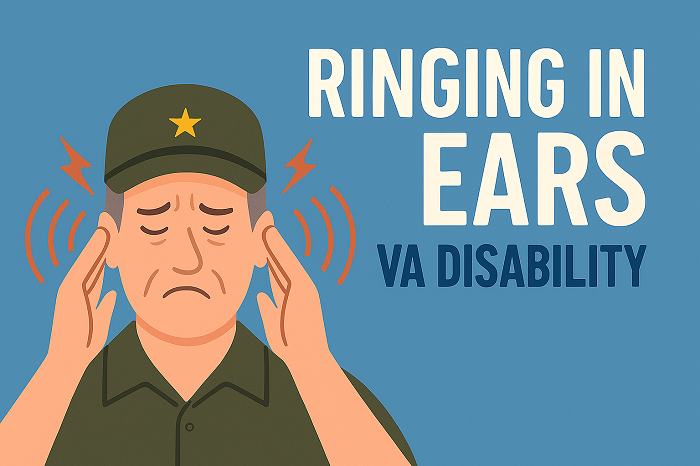
I’ve been searching everywhere about VA disability for ringing in ears and this is by far the clearest guide I’ve found. Most sites just repeat the same info, but yours actually explained how the VA rating system for tinnitus works and what to expect during the claim process.
That $171.23 monthly might not seem like much to some, but it means a lot when you’re dealing with constant ear ringing that affects your sleep and mental focus. I’ll be using this guide to file my claim this month — thank you!